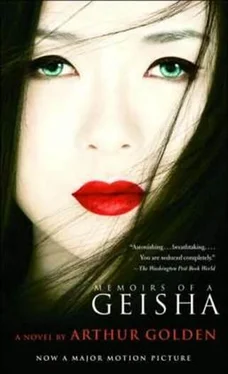During this period I continued seeing Nobu whenever he came to Gion, and did my best to act as though nothing had changed. Probably he’d expected I would be his mistress by the middle of July. Certainly I’d expected it; but even when the month came to a close, his negotiations seemed to have led nowhere. Several times during the following weeks I noticed him looking at me with puzzlement. And then one night he greeted the mistress of the Ichiriki Teahouse in the curtest manner I’d ever seen, by strolling past without so much as a nod. The mistress had always valued Nobu as a customer, and gave me a look that seemed surprised and worried all at once. When I joined the party Nobu was giving, I couldn’t help noticing signs of anger-a rippling muscle in his jaw, and a certain briskness with which he tossed sake into his mouth. I can’t say I blamed him for feeling as he did. I thought he must consider me heartless, to have repaid his many kindnesses with neglect. I fell into a gloomy spell thinking these thoughts, until the sound of a sake cup set down with a tick startled me out of it. When I looked up, Nobu was watching me. Guests all around him were laughing and enjoying themselves, and there he sat with his eyes fixed on me, as lost in his thoughts as I had been in mine. We were like two wet spots in the midst of burning charcoal.

During September of that year, while I was still eighteen years old, General Tottori and I drank sake together in a ceremony at the Ichiriki Teahouse. This was the same ceremony I’d first performed with Mameha when she became my older sister, and later with Dr. Crab just before my mizuage . In the weeks afterward, everyone congratulated Mother for having made such a favorable alliance.
On that very first night after the ceremony, I went on the General’s instructions to a small inn in the northwest of Kyoto called Suruya, with only three rooms. I was so accustomed by this time to lavish surroundings that the shabbiness of the Suruya surprised me. The room smelled of mildew, and the tatami were so bloated and sodden that they seemed to make a sighing noise when I stepped on them. Plaster had crumbled near the floor in one corner. I could hear an old man reading a magazine article aloud in an adjacent room. The longer I knelt there, the more out of sorts I felt, so that I was positively relieved when the General finally arrived-even though he did nothing more, after I had greeted him, than turn on the radio and sit drinking a beer.
After a time he went downstairs to take a bath. When he returned to the room, he took off his robe at once and walked around completely naked toweling his hair, with his little round belly protruding below his chest and a great patch of hair beneath it. I had never seen a man naked before, and I found the General’s sagging bottom almost comical. But when he faced me I must admit my eyes went straight to where… well, to where his “eel” ought to have been. Something was flapping around there, but only when the General lay on his back and told me to take off my clothes did it begin to surface. He was such a strange little nugget of a man, but completely unabashed about telling me what to do. I’d been afraid I’d have to find some way of pleasing him, but as it turned out, all I had to do was follow orders. In the three years since my mizuage , I’d forgotten the sheer terror I’d felt when the Doctor finally lowered himself onto me. I remembered it now, but the strange thing was that I didn’t feel terror so much as a kind of vague queasiness. The General left the radio on-and the lights as well, as if he wanted to be sure I saw the drabness of the room clearly, right down to the water stain on the ceiling.
As the months passed, this queasiness went away, and my encounters with the General became nothing more than an unpleasant twice-weekly routine. Sometimes I wondered what it might be like with the Chairman; and to tell the truth, I was a bit afraid it might be distasteful, just as with the Doctor and the General. Then something happened to make me see things differently. Around this time a man named Yasuda Akira, who’d been in all the magazines because of the success of a new kind of bicycle light he’d designed, began coming to Gion regularly. He wasn’t welcome at the Ichiriki yet and probably couldn’t have afforded it in any case, but he spent three or four evenings a week at a little teahouse called Tatematsu, in the Tominaga-cho section of Gion, not far from our okiya. I first met him at a banquet one night during the spring of 1939, when I was nineteen years old. He was so much younger than the men around him-probably no more than thirty-that I noticed him the moment I came into the room. He had the same sort of dignity as the Chairman. I found him very attractive sitting there with his shirtsleeves rolled up and his jacket behind him on the mats. For a moment I watched an old man nearby, who raised up his chopsticks with a little piece of braised tofu and his mouth already as wide as it would go; this gave me the impression of a door being slid open so that a turtle could march slowly through. By contrast it made me almost weak to see the way Yasuda-san, with his graceful, sculpted arm, put a bite of braised beef into his mouth with his lips parted sensuously.
I made my way around the circle of men, and when I came to him and introduced myself, he said, “I hope you’ll forgive me.”
“Forgive you? Why, what have you done?” I asked him.
“I’ve been very rude,” he replied. “I haven’t been able to take my eyes off you all evening.”
On impulse I reached into my obi for the brocade card holder I kept there, and discreetly removed one card, which I passed to him. Geisha always carry name cards with them just as businessmen carry business cards. Mine was very small, half the size of an ordinary calling card, printed on heavy rice paper with only the words “Gion” and “Sayuri” written on it in calligraphy. It was spring, so I was carrying cards decorated with a colorful spray of plum blossoms in the background. Yasuda admired it for a moment before putting it into his shirt pocket. I had the feeling no words we spoke could be as eloquent as this simple interaction, so I bowed to him and went on to the next man.
From that day, Yasuda-san began asking me to the Tatematsu Teahouse every week to entertain him. I was never able to go as often as he wanted me. But about three months after we first met, he brought me a kimono one afternoon as a gift. I felt very flattered, even though in truth it wasn’t a sophisticated robe-woven with a poor quality silk in somewhat garish colors, and with a commonplace design of flowers and butterflies. He wanted me to wear it for him one evening soon, and I promised him I would. But when I returned to the okiya with it that night, Mother saw me carrying the package up the stairs and took it away from me to have a look. She sneered when she saw the robe, and said she wouldn’t have me seen in anything so unattractive. The very next day, she sold it.
When I found out what she’d done, I said to her as boldly as I dared that the robe had been given to me as a gift, not to the okiya, and that it wasn’t right for her to have sold it.
“Certainly it was your robe,” she said. “But you are the daughter of the okiya. What belongs to the okiya belongs to you, and the other way around as well.”
I was so angry at Mother after this that I couldn’t even bring myself to look at her. As for Yasuda-san, who’d wanted to see the robe on me, I told him that because of its colors and its butterfly motif, I could wear it only very early in the spring, and since it was now already summer, nearly a year would have to pass before he could see me in it. He didn’t seem too upset to hear this.
Читать дальше













